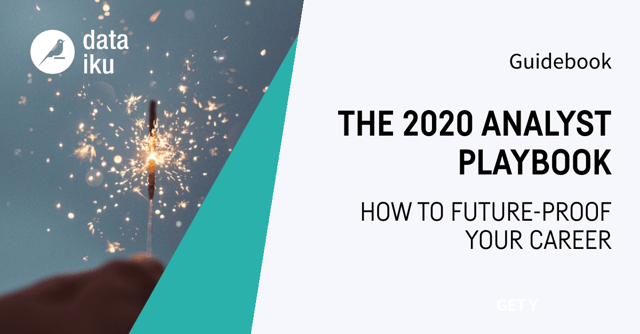The role of a data or business analyst comes in different forms and can even span across different job positions. At the same time, new types of data, tools, and technologies are shaping the jobs of analysts, taking them in exciting new directions. What will the future data analyst look like?
Here are some of the new and emerging data analytics roles that likely will be more and more in demand in the near future, and that could represent interesting career development opportunities for analysts across industries.
 Get the guidebook to learn more about the future of data analysts & analytics
Get the guidebook to learn more about the future of data analysts & analytics
The Citizen Data Scientist
While automated machine learning, or AutoML, is useful for embedding AI methodology at the core of an organization, AI maturity cannot improve without expanding the breadth of people that have access to and work with data on a day-to-day basis.
Thus, from this cultural shift toward a data-driven culture and the economic imperative of data insights, the citizen data scientist is born. Regardless of their actual title (marketing analytics manager, risk analyst, etc.), this role is a potential win for all Data Wizards, who can strengthen insights with more valuable and less mundane work.
Through 2021, the number of citizen data scientists will grow five times faster than the number of highly skilled data scientists.
Gartner, How to Enable Self-Service Analytics. Carlie Idoine, 9 September 2019
While it’s true that incorporating the work of non-data scientists into data projects in meaningful ways requires a fundamental shift in mindset around data tooling, analysts don’t need to master all the intricacies of advanced machine learning, feature engineering, etc. What they do bring to the table is an intimate knowledge of the problems at hand and the business questions that need to be answered.
The Data Translator
The role of a data translator consists in bridging the technical expertise of data engineers and data scientists with the operational expertise of marketing, supply chain, manufacturing, risk, and other industry domains.
This emerging role can be a perfect fit for analysts with fine knowledge of lines of business and strong communication skills, as they often have the best perspective of the whole business because they see the full scope of operations through data, and they also know the details that drive success and failure. Especially if they’ve spent a bit of time in the organization, they’re knowledgeable about the business and the industry.
The Data Explorer
Data analysts with a knack for data visualization might find a suitable future orientation towards the role of Data Explorer. This new role would probably require a lot more creativity than your current one, but it’s nothing that an analytics expert can’t handle. You need to be able to identify and connect to new data sources, merge and prepare the data, and build production-ready data pipelines.
The purpose of the products you’ll be helping to build is for them to run in production, and so you’ll be obsessed with automation and reproducibility. You’ll be the local expert on the details of the data — when a new data source is added, you’ll know what fields it contains and which new features you might be able to engineer from it.

The Data Modeler
If statistics are your strong suit, you’ll have an equally bright future as a Data Modeler. You will be in charge of building predictive models and generating either a product or a service from those models, and then implementing them. You will create checks and metrics for monitoring these models, because there will be a huge amount of them in production!
You will be a master of machine learning models and the frameworks used to validate their quality. You will apply your creativity in feature engineering: using abstract mathematical techniques to select and combine the right variables and use them in the right model. This will often require you to reduce the number of variables from an enormous number down to something more manageable.
In short, you will be the go-to person on your team for all things math, stats, and algorithms — and also for knowing how to use different types of data in the many models available to you at your fingertips.
The Data & Analytics Product Owner
There are many paths that lead to this role. You might already have been a Data Explorer or a Data Modeler, or you might lead an analytics team, or you might come from outside the analytics team altogether. No matter what your background, you’ve established a good, well-rounded expertise in the world of data science and machine learning, and coupled with your skills in management and communication, you’re poised to thrive in your new role.
You will be the person the organization relies on to ensure value comes out of all the data and analytics products and operations. It’s a big job… but it’s challenging and rewarding. You will need to understand the challenges and tools available to both the Data Explorer and Data Modeler well enough to get into the weeds with them, so brush up on your architecture, stats, and machine learning algorithms. Having experience working in an agile environment will also help you as you manage multiple projects in a fast-moving environment. You will need to apply user experience (UX) and design thinking concepts to data products and services that will no longer be used only by technical users but instead by the broader organization and even users and customers outside the organization.




